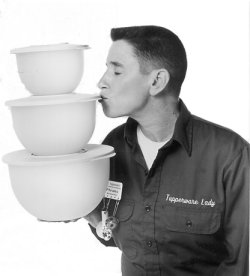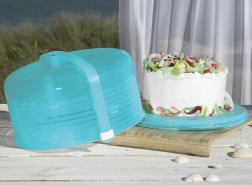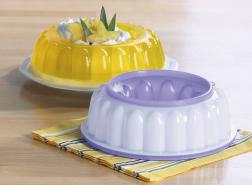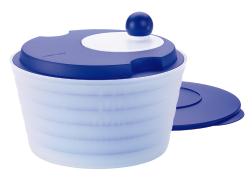Via Salon's Broadsheet blog, which was itself citing a
New York Times article, I learned this summer that Lands' End had introduced a revolutionary new swim line promising suits “thoughtfully designed to fit real women and flatter every figure.”
Every figure? Really, Lands' End, are you sure you want to make that claim?
I'm shaped, roughly, like a refrigerator, with identical hip and bust measurements, without a heck of a lot of contour in between. Oh, and I have only one boob—just born that way, or developed that way at any rate. And no amount of one-armed pull-ups during my teenage years did a lick of good, as my horrified pubescent self gamely tried to help the stunted hemisphere catch up with its mate.
Go for it, Lands' End, show
me the suit of my dreams.
I visited the online site and called up their virtual model, where a girl can plug in her own ghastly stats and try suits on her CGI doppelgänger. I had big ideas about giving my CGI self a makeover, with a crew cut and glasses and a less vacant look, but I couldn't even get the thing to accept my measurements, not because it didn't believe such a figure existed but because the application didn't like Safari. Nor did it like Explorer. And I'm not going to download a new browser for any goddamn swimsuit model. So my virtual model defaulted to something like the actress Anne Archer, which isn't terrible, as CGI selves go, but she wasn't going to be very illustrative of me without considerable imagination.
Lands' End offers a variety of ways to shop: by “anxiety zone” (my brain?), body shape, suit type, bra style, and…omigod, they have mastectomy suits with built-in pockets for prostheses! This really
is revolutionary! Though in the past I've installed my own fake-boob pocket—a deconstructed sock sewn into the suit's “breast shelf”—my fix has always left me wanting. For starters, I think I look reasonably lopsided even
with my gelatinous friend in place. Then there's the whole fear about it falling overboard whenever I'm hit by a wave, causing me to grope at it anxiously and often—at which time its stress-ball-like properties come in handy. (Ha! Get it?)
I've been kluging my own solutions for so long it never occurred to me that there might be more “manufactured” options. A mastectomy suit would be almost as momentous a leap forward for me as when I switched to silicone from foam, which lacked natural movement
and absorbed water. Yep, that girl you saw so many years ago wringing out her boob as she emerged from the Big Sur River—that was me.
My breast(s) and I, we have an uneasy relationship.
Have you ever been to Frederick's of Hollywood with your mother? I have, and I can't say as I recommend it. This was back in the day, in Orange County, and Frederick's may as well have been the moon—if the moon were populated entirely by things you never, ever wanted to see in the presence of your mother, like panties whose crotches were decorated with feathers and googly eyes. But my imbalance—the fleshy, not chemical, one—was becoming obvious as I transitioned from a “B” to a “C” cup in early teenagehood, and my mother had heard Frederick's sold “breast enhancers.”
If there are two things my mother can't stand, and certainly there are many more than two, they would be slutty women and “showboaty” types. Frederick's is the five-and-dime of sluts and showboats, the twin groups' needs converging in an NC-17 miasma of hot pink, lace, and fake animal skin. And it was into this world that I was led—past the fur-lined bondage cuffs and edible undies, my mother disgustedly
tsking all the way to the counter—to solve my “problem.”
A very friendly woman who was statistically likely to be named “Brandi” took me into a dressing room and nonchalantly sized me up, then she sold us a couple of sets of nylon-encased foam boobs. To “Brandi” the purchase was as controversial as soap, but we couldn't get out of there fast enough. We paused only long enough to scout our position before stepping out of the store and back into the mall, thus ensuring that a neighbor didn't happen upon us and get the wrong idea. This wouldn't be my last lesson in shame.
Now a “D” cup (nature's cruel joke on me), I'm frustrated to find that the mastectomy suits at Lands' End all seem to top out at “C.” Are bountiful breasted cancer survivors SOL?
Never fear. Lands' End offers live chat help, and no sooner had I entered my name and requested a chat session than a little window popped up and representative “Karen” asked how she could help.
“Hey, Karen,” I typed, then, because I'm not accustomed to using chat, I hit return to skip a line, at which time “Hey, Karen,” popped up as my complete reply, as though I were greeting my very best friend.
“Hello,” Karen typed, “How can I help you?” It sounded terse in my head, though I'm sure she didn't mean it that way. That's just not who “Karen” is.
I type, “I'm what your catalogue calls a 'rectangle shape' (Oh, stop it with the sweet nothings, Lands' End, you're embarrassing me!), and I need a mastectomy suit that accommodates a 'D' cup.”
*pause*
“Hold on,” Karen replied. “Let me check with our Shoppers.”
“Thanks!” I typed, hoping she was going to check not with actual customers but with someone whose official job title is “Shopper.”
*pause*
“Sorry,” Karen replied. “We don't have any 'D' cup mastectomy suits.”
“Shoot,” I typed, hoping to charm her with my quaint word choice, then I waited patiently for her to offer some alternative advice. I'm not sure what kind of advice I expected from “Karen” exactly. I'd exhausted the whole “buy a regular suit and make it your own” thing. I was looking for something more sophisticated this time. Something along the lines of, “Maybe you could just cut the other one off?” which, believe me, has occurred more than once.
“Is there anything else I can help you with?” Karen asked, a bit lamely, from my consumerist standpoint.
“No,” I replied, wondering if she could sense my disappointment in the type. “Thanks anyway.” Our chat session ended with a thud, the little window vanishing as quickly as it had appeared.
Better put an asterisk after that “flatter every figure” promise, you silver-tongued devil. It's not nice to get a girl's hopes up like that.
Looking back, fear of being found out wasn't the only reason (perhaps not even the main one) I was shy about boyfriends groping my breasts. But at the time it seemed like such a momentous announcement—maybe even a deal-breaker: “By the way, before you feel me up, I should tell you not to be put off by a certain sponginess on my right side.” Since I didn't much date guys I couldn't take in a bar fight, most of them took it well enough, though they more or less avoided my little underachiever from then on.
Lesbians, you may have heard, are of a different breed entirely, and the girls have by and large found my stunted member compelling, if not downright fetish-worthy. From girlfriend number 1, the littlest mammary has enjoyed acceptance and affection, and girlfriend number 6 suggested that we go so far as to
celebrate it with a unilateral piercing. This wasn't long after I had first seen—in a feminist bookstore, natch—the “Tree” poster of a topless Deena Metzger, her arms spread wide in joyful tribute to her tattooed mastectomy site.
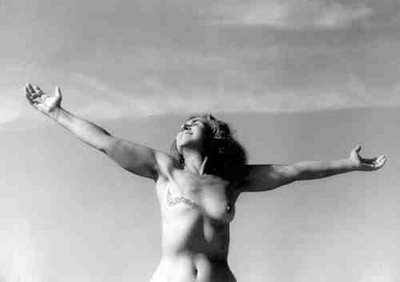
I became fascinated by the idea of turning a potential source of shame into a focal point. “Let's do it,” I said, and just for the asking I was shirtless in a gynecological exam chair, a heavily pierced and tattooed dyke asking me where I wanted it. “My right,” I said, losing my bra. The piercer smiled and nodded at the dwarfish one. “Cool,” she purred, and got to work.
If there's enough call for the term
acrotomophiles—folks sexually attracted to people with missing limbs—surely there's a tiny kingdom in which I and my fellow uniboobs would be worshipped by dint of what's not there, and methinks it would be populated largely, if not entirely, by lesbians. God bless 'em.
I ordered a mastectomy “tankini” in a “C” cup, and upon receipt I was delighted to find its built-in “soft-cup bra” just generous enough that I could pour myself ever so gently into its smallish confines. (You're not off the hook, Lands' End—see to those generously endowed cancer survivors PDQ!)
Still, I see a little breastwork in my near future: I think I'm gonna let 'em cut the other one off. I know that this imperils my status as an object of worship, but the imbalance is almost certainly exacerbating my spinal arthritis, and at this point I measure relief by the inch, not the yard. I hope to get it lopped off in the next year or so, thus achieving the boy-girl body of my dreams. (Is it too late to become a supermodel?)
At any rate, my left side has seen quite enough attention lavished on the right, and she's felt more than a little slighted: Imagine for a moment that you're a conjoined twin—no, really, imagine it—and that your dwarf sister, who was for many years considered grotesque and weird in comparison to you, because, you know, though you had a dwarf growing out of your side you had developed in a more expected way, is now continually fêted because, after all, isn't she just as cute as a button? And come to think of it, who ever said bigger was better, Jolly Green Giant? Yeah, you'd be pissed, too. And maybe it's about time ol' lefty meets the brief, white-hot pain of a piercing needle and joins the ranks of her much-venerated sister. She's been in exile so long, my left breast, the prodigal daughter led astray by punky hormones all those many years ago, and she's ready to come home at last.


